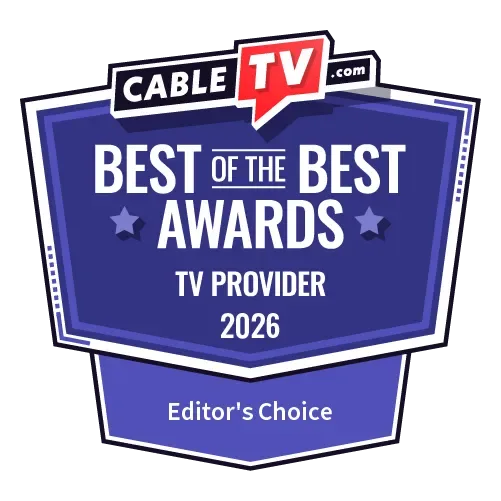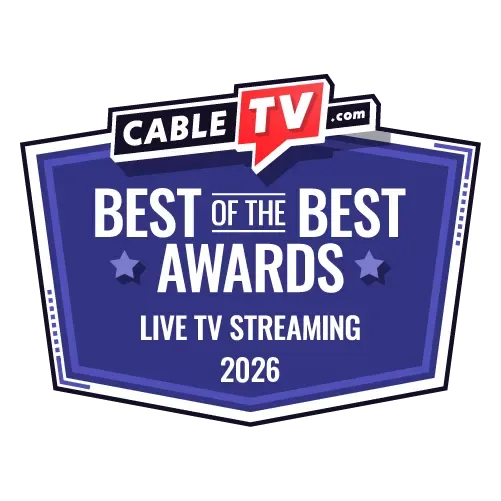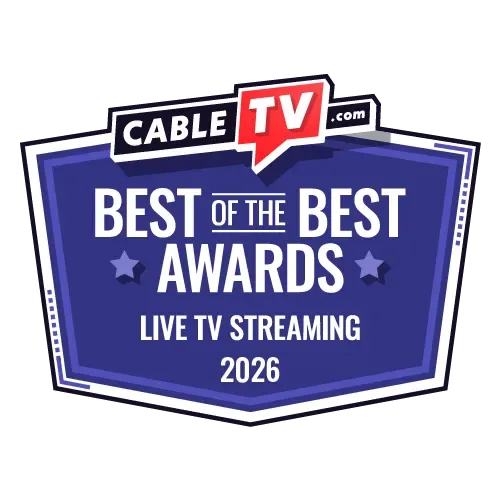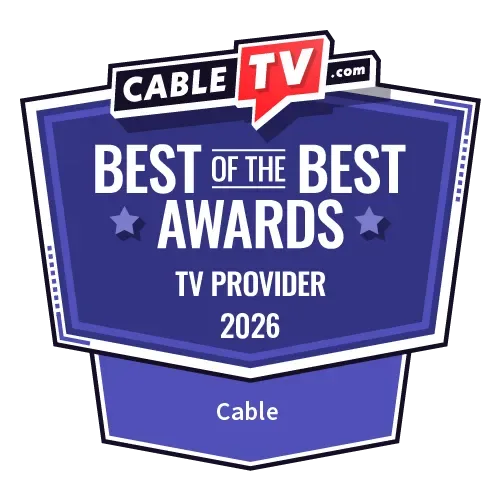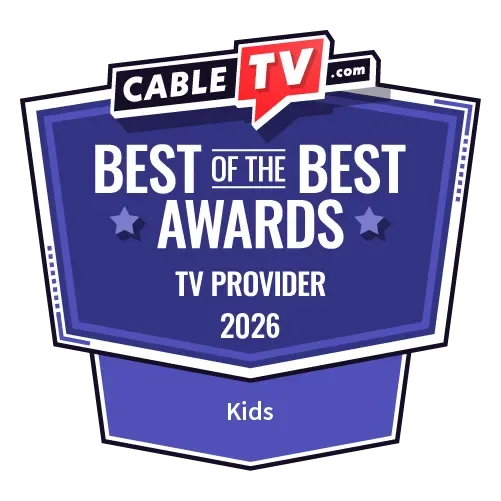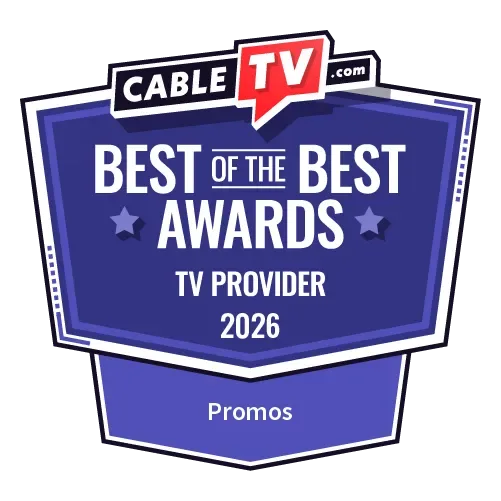What TV service is best?
The CableTV.com crew and I have done our research and testing, and we have narrowed down your options to only the Best of the Best TV service providers.
Verizon Fios wins our top Best of the Best Award for the best overall traditional TV provider. It has stacked channel counts, transparent pricing, high reliability, and tons of promos to sweeten the pot. Plus, it scored high marks across our entire 2026 TV Customer Satisfaction Survey. It may not have the widest availability, and its plans can be a bit pricey, but it is the absolute cream of the TV crop. Basically, if Verizon Fios TV is available near you, get it.
I think Spectrum TV Stream is the best value TV service out there. You’ll get 85+ channels for just $40.00/mo.—a phenomenal value for only forty (!) bucks a month. Customers love it, too: Spectrum TV Stream received the highest overall satisfaction rating (78%) in our customer satisfaction survey and ranked first in 12 of 20 questions.
We’ve put DIRECTV down as our Best of the Best pick for the top TV provider for sports, thanks to a comprehensive sports experience with 30+ sports channels, wide regional sports network (RSN) availability, and a user-friendly interface.
Read on to learn more about why these providers (and more!) earned our awards. I’ll also tell you why Xfinity is the reigning best traditional cable provider, Apple TV shines for on-demand streaming, and YouTube TV stands strong for live TV streaming.
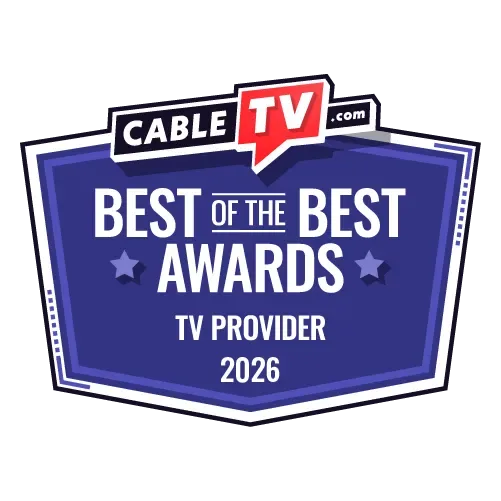
Compare top TV providers at a glance
| Provider | Price | Channels | Details |
|---|---|---|---|
|
Apple TV Best On-Demand Streaming |
$12.99/mo. | N/A |
View Plans for Apple TV+ Read full review |
| Cox | $20.00–$184.00/mo. | 75–250+ |
View Plans for Cox Read full review |
|
DIRECTV (satellite) Best for Promos |
$89.99–$169.99/mo. | 165–340+ |
View Plans for DIRECTV Read full review |
|
DIRECTV (streaming) Best for Sports |
$89.99–$169.99/mo. | 90–185+ |
View Plans for DIRECTV STREAM Read full review |
| DISH | $89.99–$119.99/mo. | 190–290+ |
View Plans for DISH Read full review |
| Hulu + Live TV | $88.99–$99.99/mo. | 95+ |
View Plans for Hulu Read full review |
| Netflix | $7.99–$24.99/mo. | N/A |
View Plans for Netflix Read full review |
| Optimum | $15.00–$140.00/mo. | 50–250+ |
View Plans for Optimum Read full review |
| Philo | $33.00/mo. | 70+ |
View Plans for Philo Read full review |
| Sling TV | $19.99–$60.99/mo. | 10–48+ |
View Plans for Sling TV Read full review |
| Spectrum (cable) | $40.00–$110.00/mo. | 150–160+ |
Read full review |
|
Spectrum TV Stream Best Bang for Your Buck |
$40.00/mo. | 85+ |
View Plans for Spectrum Read full review |
|
Verizon Fios Best of the Best |
$105.00–$149.00/mo. | 60–425+ |
View Plans for Verizon Read full review |
|
Xfinity Best Cable Provider |
$55.00–$125.00/mo. | 10–185+ |
View Plans for Xfinity Read full review |
|
YouTube TV Best Live TV Streaming |
$82.99/mo. | 100+ |
View Plans for YouTube TV Read full review |
Data as of post date. Offers and availability may vary by location and are subject to change. See full disclaimer for details.
Best of the Best: Verizon Fios
Why we love it: Large channel counts; great signup deals; high customer satisfaction
Why we hate it: Limited availability; limited plan choices
I’ve given Verizon Fios our trophy for the best TV provider out there in 2026. It’s hard to imagine a more comprehensive TV service, offering customers the highest channel counts of any provider at reasonable prices. Plus, Verizon Fios offers solid signup deals with no pesky contracts or sneaky promo pricing.
While we do love that cable providers like Spectrum offer free streaming services with their plans, you’ll be paying for them in a year’s time in the form of a second-year price hike. You’ll get no scheduled price hikes with Verizon Fios.
But don’t just listen to me; check out this year’s TV Customer Satisfaction Survey. Although pushed off the top spot it had held for years (skip down to the next section to read more about the winner), Verizon was still in the top 3 providers in 16 of 20 questions.
This trend continued across other national surveys. Verizon Fios TV was JD Power’s 2025 winner for highest satisfaction across all cable and satellite TV providers. In a similar survey conducted by the American Customer Satisfaction Index (ACSI), Verizon Fios was also the highest-scoring overall subscription TV service, scoring a whopping 8 points higher than the baseline for TV satisfaction.
Hear from real Verizon Fios customers
"It truly is a good service, no quirks, and completely clear in quality. I definitely would recommend."
I also picked Verizon Fios as the Best of the Best for Channels. Channel selection-wise, Verizon can’t be beat. It has the highest channel count of any provider, offering a whopping 60–425+ channels across its three plans. But if there’s one thing I know from all my TV researchin’ and testin’, it’s that channel count ≠ channel quality, that’s for sure. Providers love stuffing their lineups with filler channels like music channels to pad the overall count.
Verizon’s guilty of that stuffing, but it also has the quality to back it up, offering all 35 of the most-watched channels in the U.S., according to Variety. Verizon also boasts a super low cost-per-channel—its The Most Fios TV plan ($149.00/mo., 425+ channels) costs just $0.35 a channel. That’s the lowest of all the traditional TV providers.
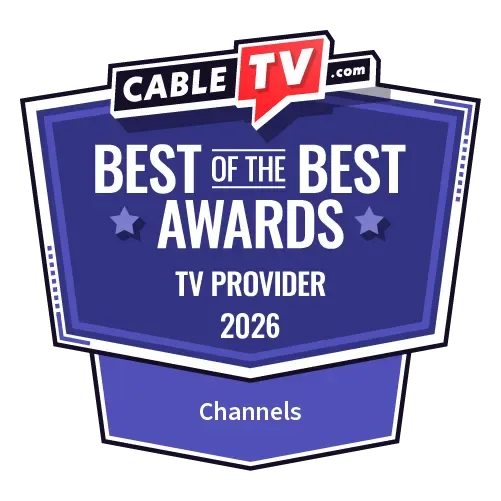
Editor’s Choice: Spectrum TV Stream
Why we love it: Extremely affordable; overall customer satisfaction survey winner
Why we hate it: No local or sports channels; Spectrum Internet® required
Spectrum TV Stream is both the newest provider in our yearly customer satisfaction rankings and this year’s top performer. Coming in first on over half of the questions, Spectrum’s live TV streaming service has totally shaken up our awards this year.
Although not our pick for the ultimate Best of the Best service, Spectrum TV Stream’s value is the one to beat, offering up 85+ channels for the low price of just $40.00/mo.. I’m serious when I say that you can’t beat that price with a stick. Getting cable TV for less than $50 a month is basically unheard of these days.
Customers are also overwhelmingly happy with TV Stream’s price point, as it ranked first in our bang for your buck question, pushing perennial winner Verizon Fios out of the top spot. Verizon has had a couple of price increases over the past few years (a trend among most cable and streaming providers). In contrast, TV Stream’s price decreased by $5 last year.
Outside of it being the best TV service for your budget, I’ve also chosen Spectrum TV Stream as my personal pick for Editor’s Choice. Meaning, this is the TV service I’d spend my hard-earned money on, particularly because it doesn’t cost much of my hard-earned money at all.
As an elder Zoomer, it’s probably not a surprise that I’m not a big watcher of linear TV. If I want to venture outside my fave YouTube documentary channels (shoutout to History Hit), I often turn to the free Roku Channel’s Unsolved Mysteries and Columbo channels. Yes, I am 26, not 62.
But even still, sometimes I need some live TV action in my life, and Spectrum TV Stream has all of my most-watched channels, including CNN, HISTORY, HLN, TCM, and Travel Channel.
TV Stream, as you can see from flicking through our dedicated channel guide, leans heavily towards entertainment and lifestyle channels. Neither I nor my partner care about sports, so TV Stream’s lack of sports channels is a non-issue for our household. But for those who need that sports action, I’ve got just the service for you.
Spectrum TV Stream’s lack of local channels can be easily remedied with a one-time purchase of a cheap over-the-air antenna (OTA). We have one that we pull out for events like the Super Bowl (we’re in it for the snacks) and the New Year’s ball drop, and it serves its purpose well.

Best of the Best for Sports: DIRECTV
Why we love it: Large channel counts; high customer satisfaction; user-friendly interface; wide RSN availability
Why we hate it: Expensive plans; requires an internet connection
If you crave sportsball action like oxygen, DIRECTV’s live TV streaming service is the one for you. It has tons of sports channels, including FS1, FS2, Golf Channel, NFL Network, NHL Network, NBA TV, and more. DIRECTV also offers sweet sports add-ons, including the DIRECTV Sports Pack, MLS Season Pass, and NBA League Pass.
DIRECTV doesn’t require a contract, although you can lock in your price ($89.99–$169.99/mo.) for two years with a 24-month agreement that comes with a DIRECTV streaming device. Unfortunately, that pricing remains pretty darn high.
DIRECTV still has a solid channel count (90–185+), though, including over 30 (!) sports channels. “DIRECTV is unmatched for local and national sports coverage. But it’s worth noting that access comes with a Regional Sports Fee on CHOICE packages and above—a cost you’ll face once any introductory deals expire,” says Sports Editor Taylor Kujawa. “You’re ultimately paying a premium for that extensive sports lineup, so it’s only the best option for diehard fans who want the most comprehensive TV plan.”
We appreciate DIRECTV’s user-friendly interface, which makes it super easy to adapt to, even for die-hard traditional TV users. DIRECTV’s use of channel numbers is a huge plus in our book, helping keep things similar to traditional TV while still delivering a sleek live TV streaming experience. Customers agree: In our Live TV Streaming Customer Satisfaction Survey, 82% of DIRECTV subscribers said they were completely or very satisfied with the provider. That’s the highest among all live TV streaming services.
If you have the money, DIRECTV is a reliable service that’ll provide sports lovers with nearly everything they could want from a TV provider. Our fave package is CHOICE ($94.99/mo., 125+ channels) with its RSN access and loads of essential sports channels for NFL, MLB, NBA, and NHL games.
Best of the Best for Live TV Streaming: YouTube TV
Why we love it: User-friendly interface; unlimited DVR; multiview capabilities
Why we hate it: Higher price tag; no A&E or Lifetime
For the fifth year running, YouTube TV is our choice for the best live TV streaming service. It has 100+ channels, unlimited DVR (with a nine-month storage limit), three simultaneous streams, six user profiles, and numerous channel-pack and premium add-ons. And YouTube TV is now the official home of NFL SUNDAY TICKET (formerly a DIRECTV add-on), with loads of live, out-of-market games for football fans.
You might have noticed that YouTube TV has a high cost per channel ($0.83), but that’s not a bad thing, since live TV streaming services typically have leaner lineups stocked with popular channels. But while YouTube TV’s channel lineup has a higher concentration of popular channels, it is missing some networks, including A&E, Lifetime, and VICE. If those are must-have channels, check out our full guide to the Best Live TV Streaming Services to find a service with them.
Although I don’t have a YouTube TV subscription, my parents do, having switched from Optimum early last year. They love the easy-to-use interface and its über-accurate algorithm, and my college-basketball-loving dad can’t get enough of its multiview capabilities, which let him flip between multiple games simultaneously on the same screen.
If you’re not sure whether you’d prefer streaming TV over traditional TV, you may be able to snag a free trial of YouTube TV. I’ve seen free trials as long as 21 days before, but YouTube TV isn’t always offering one. I suggest you check out our regularly updated (by yours truly) YouTube TV deals page to see what promos they’re slingin’ at the moment.

Best of the Best for On-Demand Streaming: Apple TV
Why we love it: Excellent slate of originals; streamlined plan and pricing; no ads
Why we hate it: Limited device compatibility; little familiar content
Okay, I may not have been the one to choose our best on-demand streaming pick—that honor goes to our streaming aficionada, Olivia Bono—but I concur with her findings. Apple TV is a rarity in the ever-growing world of on-demand streaming services. Like, a service that offers only one plan level, with no ads?!? Have I stepped into a wormhole to 2016?
It’s not just simplicity that drove us to pick Apple TV as the best on-demand streamer out there. We also appreciate its transparency, with only three price increases since its inception seven years ago. Sure, no price increases would be better, but our standards are low. And compared with other top-tier providers’ ad-free tiers, Apple TV is far and away the cheapest, tied only with the inferior Paramount+.
If you’re not a fan of prestige TV, I imagine Apple TV won’t be your personal favorite. But if you love good—I mean really good—TV, Apple TV has it in spades. “Severance,” “Slow Horses,” “Hijack,” “Ted Lasso,” “Shrinking,” and the list goes on. Throw in acclaimed original movies like “The Tragedy of Macbeth” and 2026 Best Picture-nominated “F1,” and you’ve got a seriously great selection, even if there aren’t as many familiar favorites floating around the Apple TV-sphere. (Apple TV also won our streaming award for Best Exclusive Content, if you couldn’t tell.)
Also, more than likely you’re reading this review on your iPhone—claim those three free months of Apple TV now! If you’re outside the Apple ecosystem, you can still tap in with a free 7-day trial, no new iPhone strings attached.
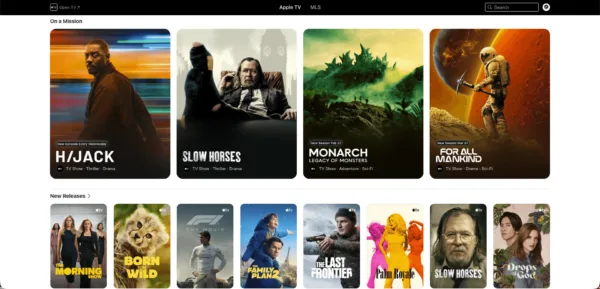
Hear from real Apple TV customers
"[Apple TV] offers high-quality original content, smooth streaming, and a clean user interface. I really enjoy the exclusive shows and movies they provide."
Best of the Best for Cable: Xfinity
Why we love it: Wide availability; great bundle discounts
Why we hate it: Hidden fees; price hikes
For years, Xfinity wasn’t a high performer in our customer satisfaction survey. Never at the bottom, they usually existed somewhere in the murky middle, never really impressing us. That is, until last year, when they made what felt like a total 180 in 2025’s customer satisfaction survey, moving up the ranks and tying for second place among individual providers.
This dominance has continued into this year’s survey, where Xfinity’s satisfaction score was even higher than that of live TV streamers like YouTube TV and Hulu + Live TV. Xfinity also ranked in the top three nationally in JD Power’s 2025 survey. So, is cable back in the game? Well, that depends …
Cable TV is still in the game, certainly, at least for now. We know that its popularity continues to decline with the ever-growing ubiquity—some may say oversaturation—of streaming services. However, plenty of people are still attached to the old cable dog. And we think, in 2026, Xfinity is the Best of the Best for Cable.
With lower starting prices and wide availability, Xfinity is a solid choice if you’re looking for a trusty cable provider. Beware of its hidden fees and price hikes, though—those sneaky add-ons are part of what hindered Xfinity from being our best value TV provider. In our ideal TV world, providers would banish all second-year price hikes and broadcast TV fees from the kingdom (Verizon Fios has done this—we love you, Verizon). But alas.
I also know that even cable TV users want the convenience of streaming their fave shows on the go. That’s why I love that the Xfinity Stream mobile app lets you stream your live TV channels, on-demand movies and shows, DVR recordings, and more. It’s one of the best mobile streaming experiences we’ve found from a traditional TV provider.
Hear from real Xfinity customers
"I have used 3 or 4 other cable services before Xfinity. None of them was as useful and reliable as Xfinity."
Best for Best for Kids: Netflix
Why we love it: Large variety of content for kids and adults alike; customizable parental control system
Why we hate it: Expensive; no more password sharing
In the past, we’ve awarded our Best for Best for Kids award to a traditional TV provider—namely, DISH. If you do want to stick to satellite or cable TV, I don’t rescind our DISH recommendation. DISH offers all the top kid-friendly channels (Nickelodeon, Disney, Cartoon Network), plus impressive parental controls through its partnership with Common Sense Media.
However, kids these days just aren’t watching linear TV—no more waiting til 6:30 p.m. ET for new episodes of “Hannah Montana” (sorry, having 2006 flashbacks now). Nowadays, kids just hop on YouTube or a streaming service to watch whatever tickles their fancy, immediately.
That’s why I’m once again concurring with our streaming expert, Olivia Bono, with her pick for the best on-demand streamer for kids: Netflix. Netflix is obviously the most instantly recognizable streaming service, which doesn’t automatically make it the best. But this popularity does help with its classic, easy-to-use interface for kids. Netflix also has a ridiculously great selection of kids’ content, including its recent saving of “Sesame Street” (rejoice!).
Netflix also offers top-notch parental controls, including a premade “Kids Profile,” so you can help supervise your child’s viewing experience. We have an entire guide dedicated to this, detailing all the different kids’ customization options Netflix offers (believe me, there’s a lot more than I can list here).
And honestly, TL;DR: Netflix wins Best of the Best for Kids because it has “KPop Demon Hunters.” Case closed.
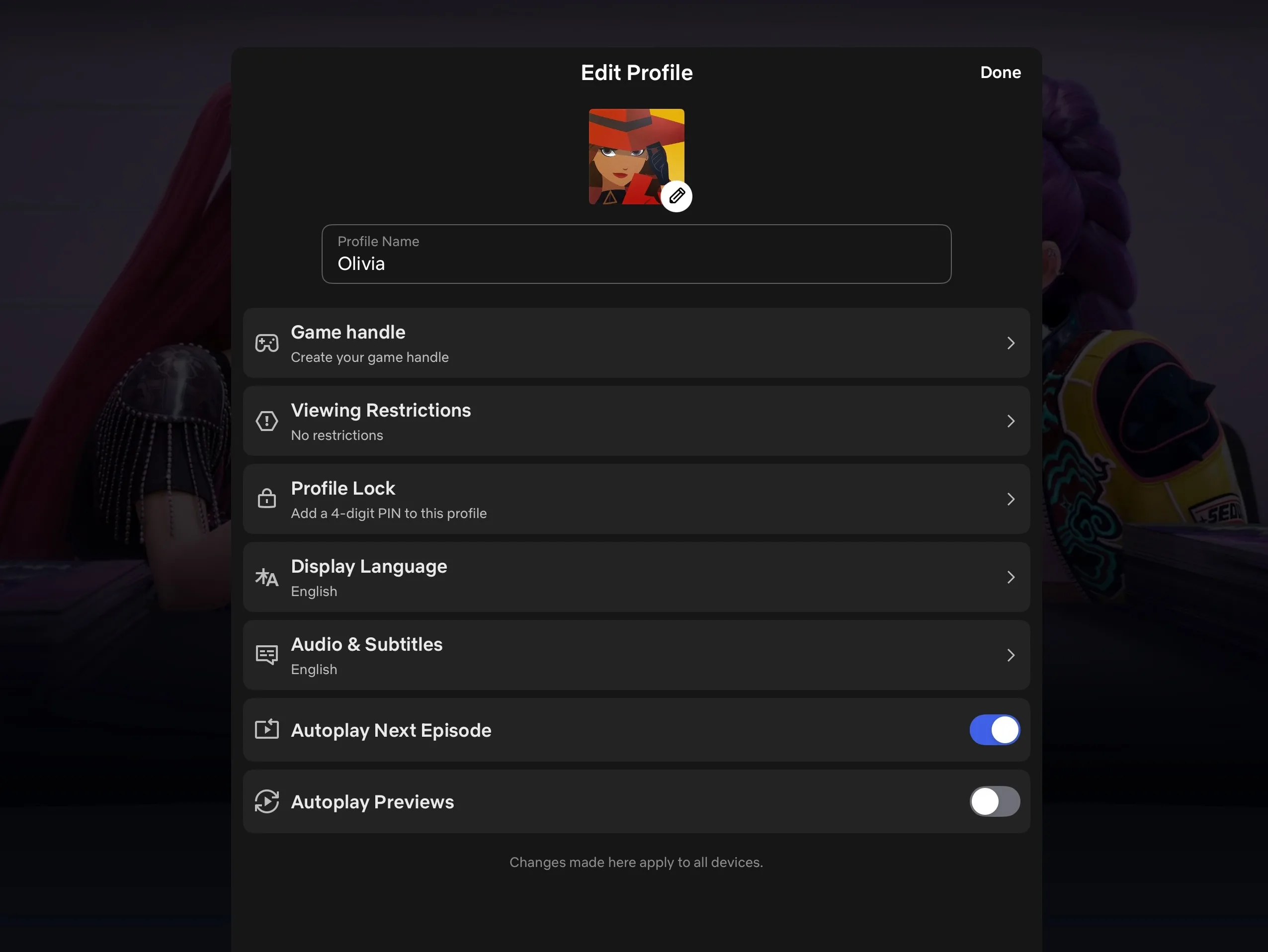
Hear from real Netflix customers
"It has a huge selection of content. It also organizes the shows well so that a particular show is easy to find."
Best of the Best for Promos: DIRECTV
Why we love it: 2-yr. price guarantee; wide selection of sports channels and add-ons; great intro deals
Why we hate it: Expensive; clunky satellite equipment; limited bundling options
Satellite TV, although notoriously less reliable than cable or fiber TV, has one major advantage: availability. You got a view of the southern sky? Boom, you can get satellite TV. That just isn’t possible with many other traditional TV providers, including (and especially) the Best of the Best, Verizon Fios, with its small nine-state availability.
This is the first year since we’ve been giving out these awards that DISH hasn’t been our pick for the top satellite TV provider. This year, DIRECTV’s satellite service (not to be confused with its streaming counterpart—also called simply DIRECTV—that’s our top TV pick for sports lovers) beat them out thanks to a better cost-per-channel value, superior reliability, and much higher customer satisfaction rankings.
If you have the money, DIRECTV is a solid service with high customer satisfaction ratings—and the PREMIER All Included package ($169.99/mo., 340+ channels) has every single channel DIRECTV offers, including HBO Max, Paramount+ Premium, Cinemax, STARZ, and MGM+. That’s the package I’d get if I could afford it.
Even if you’re not going for the top package, I think DIRECTV consistently has the best deals of any TV provider (and I personally update all of our deals pages every month!). Promos vary month to month, but DIRECTV’s got some consistent ones that keep the pot super sweet for new customers, including three free months of HBO Max, Paramount+ Premium, STARZ, Cinemax, and MGM+. They’re also letting customers bow out of having local channels to save around $12 a month. (Still want local channels? Pay $20–$40 one time and have them forever with an OTA antenna.)
Want the low-down on every deal DIRECTV’s currently serving up? Check out our handy guide to DIRECTV deals.
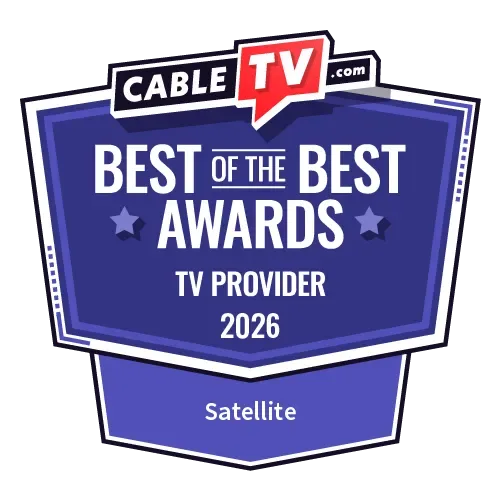
Hear from real DIRECTV customers
"We've had DIRECTV for a very long time, and we have been very satisfied—especially in the last 5 years—with the pricing and with the channels that we have."
Honorable mentions: Other top TV service providers
Cox
Cox has a few TV-only plans, plus bundles with high-speed internet, and everything is pretty expensive, even the DVR service.
Cox’s top-tier TV plan, Contour TV Ultimate ($162.00/mo. for 2 yrs.), is its best value with 250+ channels—including CINEMAX, HBO Max, Paramount+ Premium, and STARZ—plus your first TV box free. You’ll need to pay extra for DVR service, which could run you up to an additional $30 monthly. Yikes.
To compare, DIRECTV’s ULTIMATE plan has 270+ channels and 200 hours of DVR storage for only $124.99/mo. for 2 years. With DIRECTV, you’ll get more bang for your buck—and save some bucks.
DISH
For years, DISH was our pick for the best TV service in the land. Although no longer the case, we still think it’s an OK option for folks who may be out of range for cable service or a reliable internet connection for a live TV streamer. Satellite TV is great in that regard, with extremely wide availability—although I’d still pick DIRECTV over DISH if given the chance.
My DISH plan of choice would be America’s Top 200 plan ($109.99/mo., 240+ channels) because it has the most channels for the best price—$0.47 per channel is hard to beat.
We’d also name the DISH Hopper 3 ($15/mo.) as the best of the best DVR if we handed out that award. But really, it still is the cream of the crop. The Hopper 3 has 2 TB of recording capacity, allows you to record up to 16 programs at once, supports 4K resolution, and includes the DISH Voice Remote. I do hate that it comes at a monthly cost—one that can add up on top of DISH’s pricier plans.
Hulu + Live TV
Hulu + Live TV has always been on the pricier side for live TV streaming services (although YouTube TV’s recent price hike has now made the two close to the same price), but it packs in tons of popular channels and offers plenty of deals and discounts.
Hulu + Live TV also includes the Hulu bundle that includes Disney+ and ESPN Select. The massive on-demand libraries between these three top-notch streaming platforms will provide you with endless hours of entertainment if there’s nothing good on live TV.
Aside from the cost, Hulu + Live TV’s drawbacks include the absence of a few fan-favorite channels (like AMC, BBC America, and IFC) and a limit of only 2 simultaneous streams.
Spectrum (cable)
Ever since Spectrum hiked its cable TV prices in 2024 (TV Select Signature used to cost only $50!), we no longer recommend Spectrum’s cable service as wholeheartedly as we did before—it bumped them off our pedestal for best cable provider, a spot now held by Xfinity.
But Spectrum does still offer a solid 150+ channels with TV Select Signature, including all 35 of the most-watched channels, according to Variety. Plus, it offers tons of great bonuses, including oodles of included streaming services. I’m talking all the heavy hitters—HBO Max, Hulu, Disney+, and more.
If you’re looking to leave your current provider, Spectrum has another great deal for you: a contract buyout of up to $500. You also won’t have to sign a contract with Spectrum, so you can peace out whenever you’re unhappy.
What to look for in a TV provider
What? Really? You wanna do your own legwork after all the sweat we put into this? Just kiddin’—we respect you for doing additional research.
Here’s a tip sheet for TV-plan shopping to help you.
Channels: quantity vs. quality
Channel counts are only numbers—don’t rely solely on them. Review each provider’s channel lineups to ensure you get what you want. Here are some channel lineup lists from our top providers to get you started.
Contracts vs. no-contract plans
Nobody likes to be stuck with a provider and a payment that they don’t like. Be sure you understand the terms of your contract, including how long it lasts and how much you have to pay if you leave before it ends. Or, you can look for providers that don’t require contracts, like Verizon Fios, or live TV streamers like YouTube TV.
Some providers will also pay out your contracts to get your business. Optimum, Spectrum, and Verizon Fios all offer up to $500 to free you from your current contract. How nice is that?
Hidden fees
When you’ve spent all this time picking a plan with a good price and cost per channel, any extra fee feels like a surprise. Your provider should disclose these when you subscribe, but these fine-print details are easy to miss. So be on the lookout.
We go super in-depth on hidden fees for a wide range of providers. Check the list below to find your provider of choice. (Spoiler: you won’t find Verizon Fios TV or any live TV streamers like Philo or YouTube TV on there because they’re hidden fee-free!)
Best TV providers FAQ
What is the best and cheapest TV provider?
We think that Verizon Fios is the best TV provider overall because of its large channel count, low cost-per-channel, reliability, and high customer satisfaction ratings. If you're looking for a cheap TV provider, we recommend Spectrum TV Stream, which costs $40.00/mo. for 85+ channels.
What is the best TV and internet provider?
Verizon Fios TV is our top TV provider overall for internet and TV bundles. Verizon also provides amazing fiber and 5G internet service that’ll pair nicely with their Fios TV plans. Xfinity also offers great value with its internet and TV plans, serving up solid bundle discounts.
What is the best cable TV provider for the money?
Verizon Fios has the best value if we're looking at traditional TV-only plans. For live TV streaming (and overall), we'd go with YouTube TV, which offers channels for just $82.99/mo..
How do I choose a TV provider?
You can get help choosing a finding the best TV service by reading sites like ours, CableTV.com. We do all of the research for you so that you can find the best cable TV providers fast. We don't just point out the best overall TV providers. We also tell you the ones that have the best value, best kids' content (and parental controls), best sports content, best channel selection, best deals, and more. That way, you can find quality couch entertainment that's right for you. Of course, you can still do your own research. To find cable and satellite TV providers by area, enter your five-digit zip below.
What are the best cable TV providers near me?
To find cable and satellite TV providers near you, enter your zip code below.
Why you should trust us
For our annual Best of the Best Awards, our TV experts spend thousands of hours comparing and testing top TV providers on plans, pricing, channels, customer satisfaction, features, and more. We award points in each category and then calculate an overall editorial rating. We then recognize these providers in a few key categories: Best of the Best, Editor’s Choice, Best of the Best for Kids, Best of the Best for Sports, Best Bang for Your Buck, Best of the Best for Channels, and Best of the Best for Promos—so you can pick a TV provider that fits your needs.
Check out our How We Rank page to learn more about our methods.
Cox: No Term Agreement. 2 Year Price Guarantee. Pricing, packages, and policies are subject to change, including when adjusting or removing services or equipment. Prices do not include applicable taxes, surcharges, usage-based charges (such as data, toll usage, pay-per-use service), and other fees. After any promotional period, regular rates apply (see www.cox.com).
DIRECTV (satellite):
ENTERTAINMENT: ($99.99/mo. w/req’d $10/mo. TV Access Fee) w/24-mo. agmt. Autopay and paperless bill req’d. One-time $49.95 activation fee is extra and applies. CHOICE: ($124.98/mo. w/req’d $10/mo. TV Access Fee & Regional Sports Fee of up to $19.99/mo.) w/ 24-mo.agmt. Autopay and paperless bill req’d. One-time $49.95 activation fee is extra and applies. ULTIMATE: ($154.98/mo. w/req’d $10/mo. TV Access Fee & Regional Sports Fee of up to $19.99/mo.) w/ 24-mo.agmt. Autopay and paperless bill req’d. One-time $49.95 activation fee is extra and applies. PREMIER™: ($199.98/mo. w/req’d $10/mo. TV Access Fee & Regional Sports Fee of up to $19.99/mo.) w/ 24-mo. agmt. Autopay and paperless bill req’d. One-time $49.95 activation fee is extra and applies.
DIRECTV (streaming):
ENTERTAINMENT: ($99.99/mo. w/$10/mo. Gemini lease fee) Cancel anytime. CHOICE: ($124.98/mo. w/ req’d Regional Sports Fee of up to $19.99/mo. & $10/mo. Gemini lease fee). Cancel anytime. ULTIMATE: ($154.98/mo. w/ req’d Regional Sports Fee of up to $19.99/mo. & $10/mo. Gemini lease fee). Cancel anytime. PREMIER™: ($199.98/mo. w/ req’d Regional Sports Fee of up to $19.99/mo. & Gemini $10/mo. lease). Cancel anytime. OPTIMO MÁS: ($94.99/mo. w/ $10/mo. Gemini lease fee). Cancel anytime.
DISH: All offers require 2-year commitment with early termination fee and eAutoPay.
Spectrum: for 24 months + taxes & fees w/24-mo. agmt. Autopay and paperless bill req’d.
Verizon Fios TV: Prices reflect $10/mo. autopay discount. For eligible new res. custs. Availability varies. $18/mo. router charge applies if not subscribed to Fios internet. $99 setup & taxes & terms may apply. Subject to credit approval. Auto Pay and paper-free billing req’d.
Xfinity: No term contract. Broadcast TV fee extra; price subj to change. Taxes and equipment not included.


